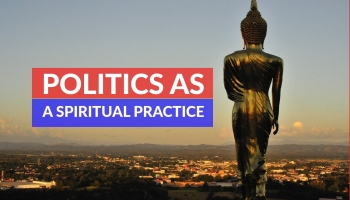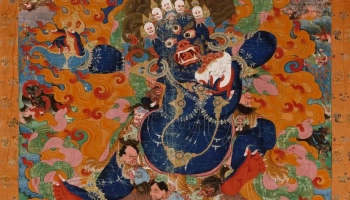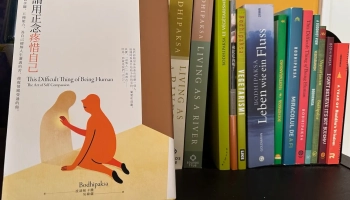
[ad_1]

On the way to enlightenment, the Buddha-to-be spent many years avoiding pleasure and strengthening his ability to tolerate discomfort. Along with many other people at that time, he practiced austerities, or tapas. This word literally means “heat,” because one form of ascetic practice involved meditating under the hot noon-day sun, sometimes also surrounded (just to make things even more intense) by four fires.
This kind of thing seems weird to us now, but back then it was all the rage among a certain set of spiritual seekers. They understood pleasure and happiness to be inextricably bound up with the weaknesses of the flesh, and believed that to find liberation the mind had to completely master the body. The Buddha-to-be bought into this for a while and did things like holding his breath until he was racked with pain, hauling out his hair and beard by the roots, sleeping on a bed of thorns, and starving himself with extreme fasting. According to his own account he got nothing much out of all this except for bringing himself close to death.
Also read:
After he’d realized the futility of these tapas practices, he began to reflect on where he’d been going wrong, and on what he might try next. The answer came to him in the form of a memory from childhood. As a child he’d been sitting under the shade of a tree, watching his father plow a field, and he’d slipped into a natural meditative state of calm, alert joy. Looking back, he realized that although he’d been afraid of the pleasure that can arise in meditation, this pleasure was in fact completely wholesome. He asked himself:
‘Why am I afraid of that pleasure, for it has nothing to do with sensual pleasures or unskillful qualities?’ Then I thought, ‘I’m not afraid of that pleasure, for it has nothing to do with sensual pleasures or unskillful qualities.’ [Mahāsaccaka Sutta, MN 36]
It struck him that there was something powerful about this state of easeful, non-grasping happiness. In fact, he wondered if this might be the path to the spiritual awakening he’d been seeking, and the moment he asked himself this question, his intuition told him in no uncertain terms, “Yes, this is the path to awakening!”
Although I said that the ascetic practices of ancient India strike us as weird, but there’s something of the spirit of the ascetics of the Buddha’s time in the modern habits of working long hours, feeling guilty about having downtime, and depriving ourselves of sleep so that we can be more productive. The ancients and many of us today both believe that a long-term goal (enlightenment in one case, and “success” in the other) can be achieved by accustoming ourselves to pain and self-denial in the present moment. It’s true that sometimes we have to do things that are challenging in the short term, because they bring future rewards. But sometimes we’re simply misguided, and the pain we subject ourselves to now is a down-payment on future ease and happiness that never actual arrives.
Now you might be thinking, “Wait! So, the Buddha was against asceticism, and yet he and his monastic disciples ate other people’s left-over food, wore rags, wouldn’t listen to music, slept under trees, and owned nothing but their robes and begging bowls? What’s that about?” Let me explain.
The way of life of early Buddhist monastics was certainly austere. They didn’t live in organized monasteries at that time — that was a development that came much later — and as I’ve described they lived very simply. The point of this, however, was not self-punishment. They were trying to keep life simple so that they could focus on spiritual practice. They weren’t afraid of pleasure or happiness as such, just the pleasure and happiness that came from sensual attractions that would draw them into family life and away from a life of full-time mindfulness and meditation.
The Buddha, remember, had come to the realization that he didn’t need to be afraid of pleasure and joy, that there were forms of these things that were skillful, and that the pleasure and joy that come from meditation are in fact the path to awakening. Speaking from my own experience, the times I’ve been consistently happiest have been those when I’ve been on retreat, living a life of extreme simplicity, very little verbal communication and plenty of opportunity to meditate, and with few responsibilities but lots of time to walk silently in nature. What a contrast that is from the stressful business of providing a taxi service for my children, paying bills, and juggling full-time work with maintaining my house and its yard.
The austere life that the early monastic community lived had its challenges. Many monks and nuns missed family life and sexual activity, and this was one of the main reasons that people disrobed. But it was for many others it was a deeply joyful life. They lived in a way that was calm, and full of love and appreciation. Meditation was a part of this.
Although meditation is meant to be enjoyable, lot of contemporary meditators don’t experience it that way. So it’s worth our asking ourselves whether we bring elements of asceticism into our meditation. Do we regard it as “work” — in the sense of a task done dutifully, where its lack of pleasure proves its worthiness? Do we regard it as one of those things that’s not very joyful but will somehow lead to joy arising in the future?
If we wonder about the lack of pleasure in our meditation at all, we may think that some sort of advanced meditation technique might be needed for our sitting practice to be enjoyable, or that perhaps we are in need of some sort of psycho-therapeutic breakthrough. In most cases all we need to do, though, is to let ourselves relax a little and stop taking ourselves so seriously. A question I often ask myself is, “Is there anything I’m doing right now that’s suppressing joy?” In the wake of that question I might notice a slight tension in the body, and let it soften. I might notice a seriousness in my attitude, or a striving after results, and let go of it. And as soon as those things happen, joy arises. It’s as if it’s always been there, waiting for me to relax enough to notice it. And it’s wonderful that joy is so easily found, because when meditation if joyful we find ourselves wanting to return to it, again and again.
Try regarding joy as being always present, waiting for you to find it. Ask yourself, “Is there anything I’m doing right now that’s suppressing joy?” Try this in meditation, and in daily life as well.
Wildmind is supported by a community of sponsors who get access to more than 40 meditation courses I’ve developed in the past, plus opportunities to practice together online. To learn more, click here.
[ad_2]
Source link






